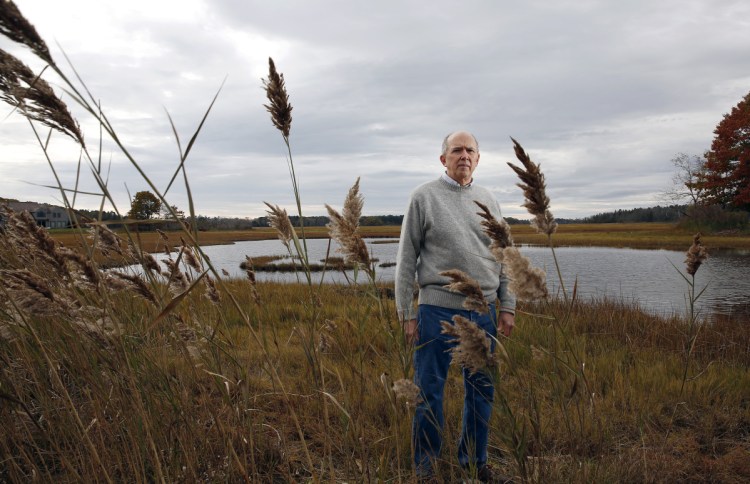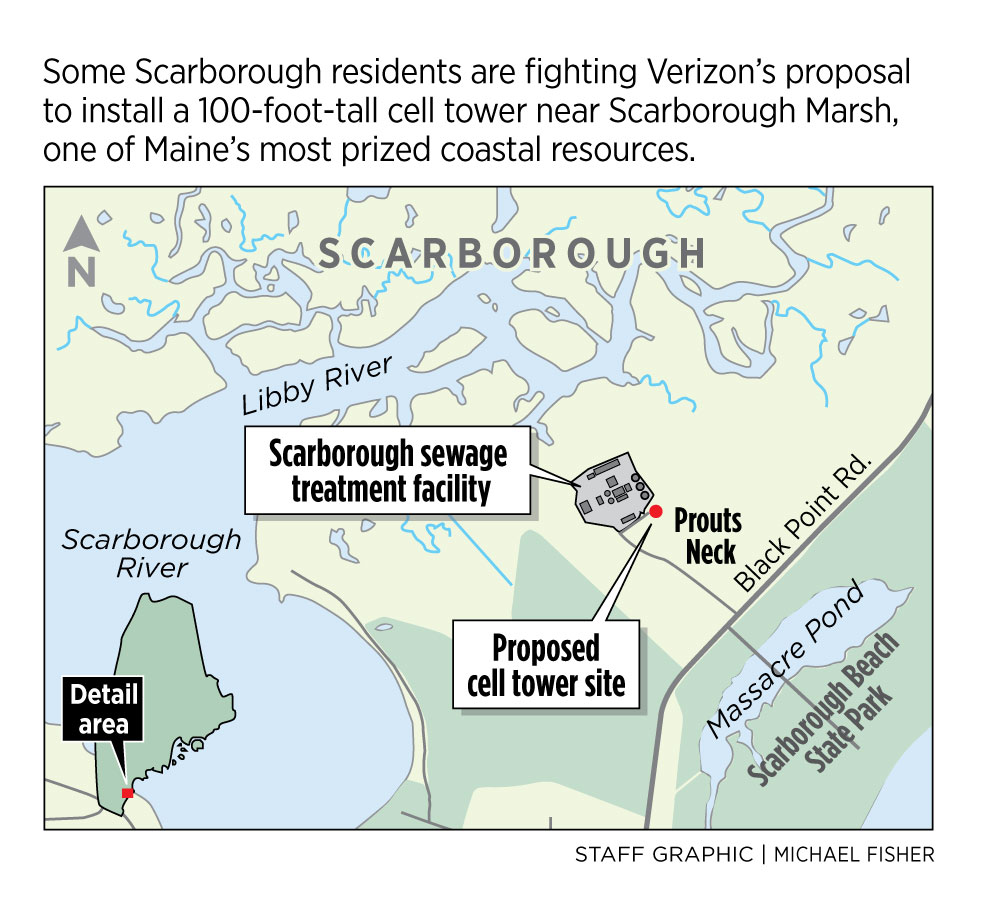SCARBOROUGH — Ann Hancock stands on her front porch on Old Neck Road, overlooking a cove where the Libby River snakes through the vast and grassy Scarborough Marsh, and she imagines the worst.
Across the marsh – about a mile away as the gull flies – in a patch of woods behind the town’s sewage treatment facility, Verizon wants to install a 100-foot-tall cell tower that would rise 20 to 30 feet above the tree line.
The tower would stand about 850 feet inland from the edge of the marsh, behind several large industrial structures that make up the sewage treatment plant off Black Point Road. Still, Hancock and her husband are among those who would have a prime view of the tower’s upper reaches.
“I call it the middle finger on the marsh,” Hancock says with droll hostility. “They’re insisting that’s the only place it can go, but I don’t believe them.”
Hancock is among a group of residents, backed by the Prouts Neck Association, who are fighting Verizon’s proposal before the Planning Board. They’ve hired experts to take on the multinational telecommunications company, including one who helped the town develop its cell tower ordinance four years ago.
Opponents of the tower say – and some town officials agree – that the ordinance is flawed because it allows Verizon to put the tower where it won’t improve local cellphone coverage and where it will spoil views of one of Maine’s most prized coastal resources.
“Scarborough Marsh is one of the most incredible places – the sight, the smell, the taste of it,” said Marvin Gates, a tower opponent who spent summers here as a kid and now lives near the marsh. “Verizon’s doing what it does. This is about a giant that roams the Earth and puts a foot down wherever it wants.”
Verizon’s lawyer, Scott Anderson of Verrill Dana in Portland, defends the cell company and its tower proposal. He disputes opponents’ charges that it will improve overall carrying capacity for Verizon’s system but not local coverage, especially near the tower itself.

A tributary of the Nonesuch River, within Scarborough Marsh, fills with the tide last week. A proposal to erect a cell tower near the Scarborough Marsh has drawn opposition due to its potential visual impact.
“That’s completely false – this tower will provide better coverage in Scarborough,” Anderson said. “And the visual impacts of the tower will be relatively minor, especially when you consider the development that’s already in that area of the marsh, including many houses and the wastewater treatment plant.”
VIEWS OF THE MARSH
Fed by several rivers and creeks, Scarborough Marsh stretches over 3,000 acres along the edge of Saco Bay, from Old Orchard Beach to Cape Elizabeth. It’s home to many rare birds and other wildlife, and it affords expansive views of spectacular sunrises and sunsets that enthrall kayakers, photographers and other outdoor enthusiasts.

A Great Blue Heron wades in Scarborough Marsh. A proposal to erect a cell tower near the Scarborough Marsh shoreline has drawn opposition due to its potential visual impact.
So, while cellphone companies often face opposition when siting towers, Verizon officials knew they were in for a pitched battle over this one, Anderson said. He disputes opponents’ claims that he has threatened to file a lawsuit if the Planning Board rejects the tower proposal, but he says the company is following rules and guidance for cell towers that are laid out in Scarborough’s zoning ordinance.
“The reason Verizon went to the (Scarborough) Sanitary District is because of the zoning,” Anderson said. “The town had really directed us to that site back in 2014 and there aren’t any other suitable sites.”
Among the discounted sites is the Black Point Fire Station property, which Ann Hancock prefers. Anderson said it’s too small and near too many homes to host a new tower or an expansion of the flagpole communications antenna that’s already there.
Moving through a complicated, three-step review process, Verizon has so far satisfied the board that there is no location more suitable than the Sanitary District’s property, said Town Planner Jay Chace.
However, the board has asked Verizon to consider other sites on district land that might reduce the tower’s visual impact. Verizon is expected to return to the board in November or December.
Verizon has been seeking board approval since January – shortly after it secured a lease from the Sanitary District for a 75-by-75-foot parcel behind the sewage treatment facility off Black Point Road for $2,500 per month or $30,000 annually. Verizon doesn’t pay rent until the project is approved.
PROTECTING LOCAL INTERESTS
The Sanitary District trustees didn’t consider how the tower might affect views of the marsh or satisfy other zoning ordinances when it approved the lease 7-0.
“We looked at the project as far as it would impact our operations and communications,” said Charles Anderson, chairman of the trustees. “The cell tower would provide some revenue to the district with no down side.”
Anderson said he’s not related to Scott Anderson, Verizon’s lawyer. He also said the trustees make a point to avoid Planning Board territory when reviewing projects.
“We knew the tower was going to be controversial (for the Planning Board),” Anderson said. “It’s not our job to preclude or mediate that discussion. We’re neutral. We don’t care if (the tower) happens or not.”
But Anderson questions whether the tower would have a significant impact on views. He lives near the marsh and has traveled its rivers and creeks.
“When I paddle on the marsh, I’m not looking at the tree line,” Anderson said. “I think it’s much ado about nothing. You’ll have to look and focus to see it, and at night you might see the light on top of the tower, but that’s about it.”
Verizon is willing to install either a standard “monopole” tower with antennas attached to the exterior; or a “monopine” tower that disguises exterior antennas in evergreen branches; or a “brown stick” tower that contains antennas within its structure, Scott Anderson said.
Anderson disputed opponents’ concern that Verizon might one day return to the Planning Board with a request to increase the tower’s height to 150 feet. Federal law would limit the extension to 120 feet, he said. He also noted AT&T and Sprint are interested in locating antennas on the tower below Verizon’s antennas.
Opponents of the tower have asked the Town Council to pass a moratorium on additional cell tower proposals until it can address gaps in the zoning ordinance. In particular, the ordinance doesn’t require companies to demonstrate that a tower will improve local cell coverage.
Town Manager Tom Hall said the council hasn’t considered the moratorium request yet, but amendments to the cell tower ordinance could be proposed in the near future.
“It’s fair criticism that the ordinance as written is not sufficient to protect abutters’ interests,” Hall said.
Send questions/comments to the editors.



